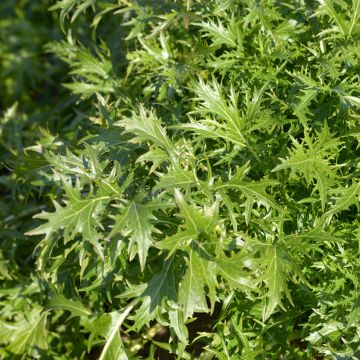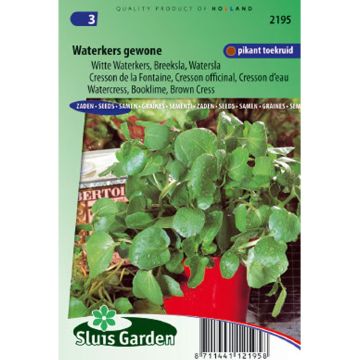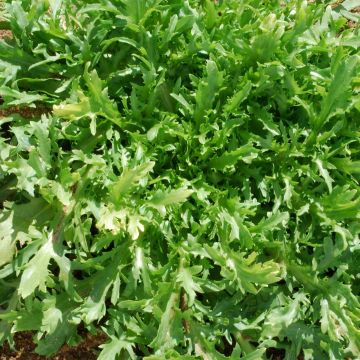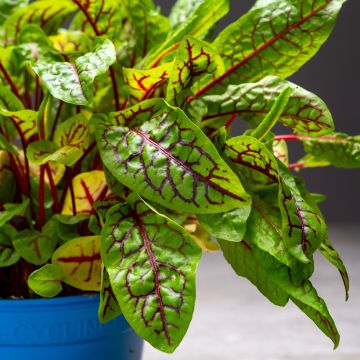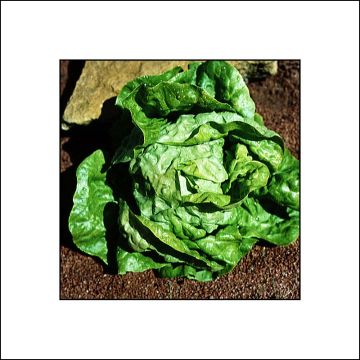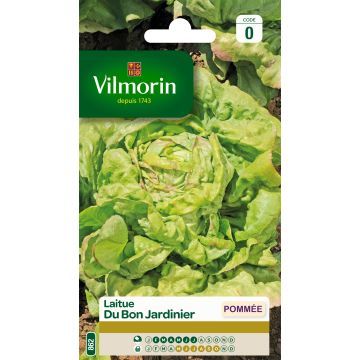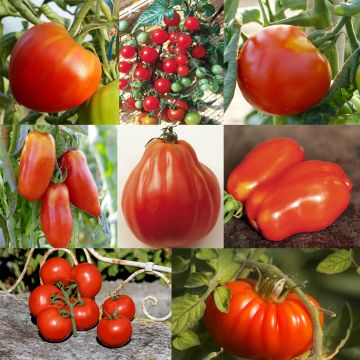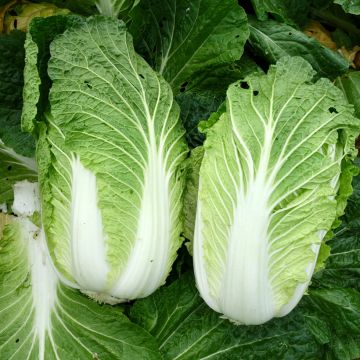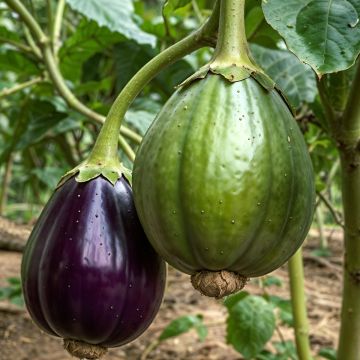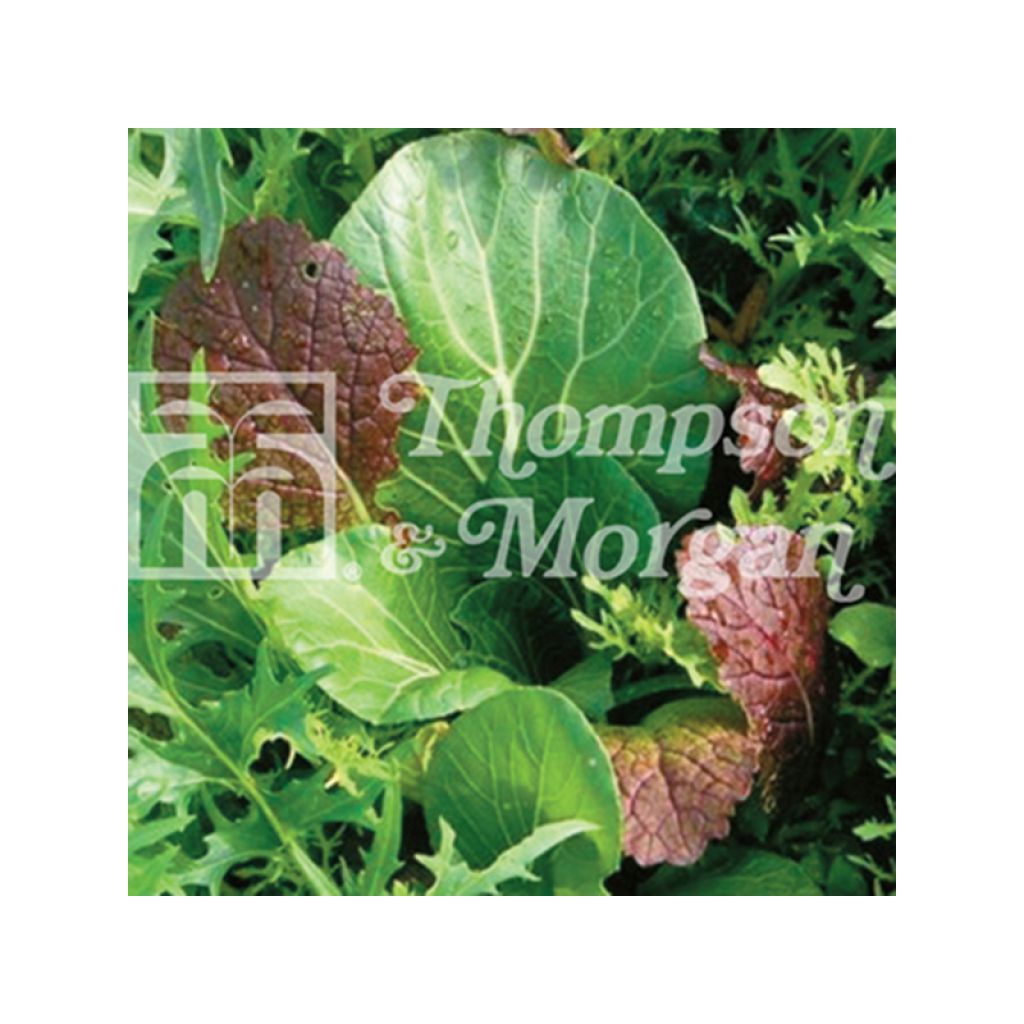

Salad Leaves Niche Oriental Mixed - Mesclun
Salad Leaves Niche Oriental Mixed - Mesclun
Lactuca Niche Oriental Mixed
Mesclun, Loose leaf lettuce, Salad greens
Special offer!
Receive a €20 voucher for any order over €90 (excluding delivery costs, credit notes, and plastic-free options)!
1- Add your favorite plants to your cart.
2- Once you have reached €90, confirm your order (you can even choose the delivery date!).
3- As soon as your order is shipped, you will receive an email containing your voucher code, valid for 3 months (90 days).
Your voucher is unique and can only be used once, for any order with a minimum value of €20, excluding delivery costs.
Can be combined with other current offers, non-divisible and non-refundable.
Home or relay delivery (depending on size and destination)
Schedule delivery date,
and select date in basket
This plant carries a 6 months recovery warranty
More information
We guarantee the quality of our plants for a full growing cycle, and will replace at our expense any plant that fails to recover under normal climatic and planting conditions.
Description
'Niche Oriental Mixed' is a blend of oriental salad greens that stand out for their beautifully diverse textures and flavours. This Mesclun is composed of Mustards, Komatsuna, Mizuna, Wild Rocket etc. Great to liven up salads! Sow and harvest all year round.
Mesclun, from the French Provençal word "mesclum" meaning "mixture", is made up of several different salad greens with a wide range of flavours. It usually includes at least five different varieties, such as Lettuce, Rocket, Lambs Lettuce etc. The leaves are generally picked when they are still young and tender. They can be harvested nearly all year round, raw or cooked.
Impatient gardeners and gourmets alike will love these seed mixes for the wonderful range of flavours they provide, at such little cost!
Harvest the young leaves as and when needed, making sure you leave enough on the plant for it to continue putting out new leaves. Use a knife to gently cut off the plants’ outer leaves.
These salad mixes are easy-to-grow and don't require much space to thrive. Why not try growing them in a planter on the edge of a balcony or in a square foot vegetable garden?
Mesclun can be stored for a few days in the vegetable compartment of the refrigerator, however it's best eaten fresh off the plant!
Useful tip: Flea beetles are partial to rocket leaves, which are often included in Mesclun mixes. They eat away at the leaves during dry and hot spells. Installing insect netting after sowing is the most effective way of controlling this problem, while avoiding the use of insecticides. Even homemade insecticides can have an impact on the garden's natural balance.
Report an error about the product description
Harvest
Plant habit
Foliage
Botanical data
Lactuca
Niche Oriental Mixed
Mesclun, Loose leaf lettuce, Salad greens
Cultivar or hybrid
Annual
Other Salad leaf seeds
View all →Planting and care
Sowing:
Salad greens germinate at a temperature of about 16°C and usually take around 10 days.
Sow under cover (cold frame, polytunnel, greenhouse) or directly outdoors from Autumn until late Spring.
In loose, well prepared soil, sow the seeds in rows, 4 cm apart, 1 cm deep and cover with soil. Leave about 35 cm between each row. When the seedlings are strong enough, thin them out by keeping one strong plant every 10 cm when harvesting at the “young leaf” stage, or one every 30 cm when harvesting at full maturity.
When growing in pots or square foot vegetable gardens, scatter the seeds lightly and thin out by keeping one strong plant every 10 cm.
Where to grow:
Salad greens are not very greedy vegetables, but they do require humus-rich soil or else they tend to bolt (go to seed) fairly quickly. Prevent this by raking a bit of well-rotted compost into the top 5 cm of the prepared seed bed in the autumn. They will do well in slightly acidic to neutral soils (PH between 5.5 and 7.5) that are kept moist. Remember to water regularly.
Seedlings
Care
Intended location
This item has not been reviewed yet - be the first to leave a review about it.
Similar products
Haven't found what you were looking for?
Hardiness is the lowest winter temperature a plant can endure without suffering serious damage or even dying. However, hardiness is affected by location (a sheltered area, such as a patio), protection (winter cover) and soil type (hardiness is improved by well-drained soil).

Photo Sharing Terms & Conditions
In order to encourage gardeners to interact and share their experiences, Promesse de fleurs offers various media enabling content to be uploaded onto its Site - in particular via the ‘Photo sharing’ module.
The User agrees to refrain from:
- Posting any content that is illegal, prejudicial, insulting, racist, inciteful to hatred, revisionist, contrary to public decency, that infringes on privacy or on the privacy rights of third parties, in particular the publicity rights of persons and goods, intellectual property rights, or the right to privacy.
- Submitting content on behalf of a third party;
- Impersonate the identity of a third party and/or publish any personal information about a third party;
In general, the User undertakes to refrain from any unethical behaviour.
All Content (in particular text, comments, files, images, photos, videos, creative works, etc.), which may be subject to property or intellectual property rights, image or other private rights, shall remain the property of the User, subject to the limited rights granted by the terms of the licence granted by Promesse de fleurs as stated below. Users are at liberty to publish or not to publish such Content on the Site, notably via the ‘Photo Sharing’ facility, and accept that this Content shall be made public and freely accessible, notably on the Internet.
Users further acknowledge, undertake to have ,and guarantee that they hold all necessary rights and permissions to publish such material on the Site, in particular with regard to the legislation in force pertaining to any privacy, property, intellectual property, image, or contractual rights, or rights of any other nature. By publishing such Content on the Site, Users acknowledge accepting full liability as publishers of the Content within the meaning of the law, and grant Promesse de fleurs, free of charge, an inclusive, worldwide licence for the said Content for the entire duration of its publication, including all reproduction, representation, up/downloading, displaying, performing, transmission, and storage rights.
Users also grant permission for their name to be linked to the Content and accept that this link may not always be made available.
By engaging in posting material, Users consent to their Content becoming automatically accessible on the Internet, in particular on other sites and/or blogs and/or web pages of the Promesse de fleurs site, including in particular social pages and the Promesse de fleurs catalogue.
Users may secure the removal of entrusted content free of charge by issuing a simple request via our contact form.
The flowering period indicated on our website applies to countries and regions located in USDA zone 8 (France, the United Kingdom, Ireland, the Netherlands, etc.)
It will vary according to where you live:
- In zones 9 to 10 (Italy, Spain, Greece, etc.), flowering will occur about 2 to 4 weeks earlier.
- In zones 6 to 7 (Germany, Poland, Slovenia, and lower mountainous regions), flowering will be delayed by 2 to 3 weeks.
- In zone 5 (Central Europe, Scandinavia), blooming will be delayed by 3 to 5 weeks.
In temperate climates, pruning of spring-flowering shrubs (forsythia, spireas, etc.) should be done just after flowering.
Pruning of summer-flowering shrubs (Indian Lilac, Perovskia, etc.) can be done in winter or spring.
In cold regions as well as with frost-sensitive plants, avoid pruning too early when severe frosts may still occur.
The planting period indicated on our website applies to countries and regions located in USDA zone 8 (France, United Kingdom, Ireland, Netherlands).
It will vary according to where you live:
- In Mediterranean zones (Marseille, Madrid, Milan, etc.), autumn and winter are the best planting periods.
- In continental zones (Strasbourg, Munich, Vienna, etc.), delay planting by 2 to 3 weeks in spring and bring it forward by 2 to 4 weeks in autumn.
- In mountainous regions (the Alps, Pyrenees, Carpathians, etc.), it is best to plant in late spring (May-June) or late summer (August-September).
The harvesting period indicated on our website applies to countries and regions in USDA zone 8 (France, England, Ireland, the Netherlands).
In colder areas (Scandinavia, Poland, Austria...) fruit and vegetable harvests are likely to be delayed by 3-4 weeks.
In warmer areas (Italy, Spain, Greece, etc.), harvesting will probably take place earlier, depending on weather conditions.
The sowing periods indicated on our website apply to countries and regions within USDA Zone 8 (France, UK, Ireland, Netherlands).
In colder areas (Scandinavia, Poland, Austria...), delay any outdoor sowing by 3-4 weeks, or sow under glass.
In warmer climes (Italy, Spain, Greece, etc.), bring outdoor sowing forward by a few weeks.






























